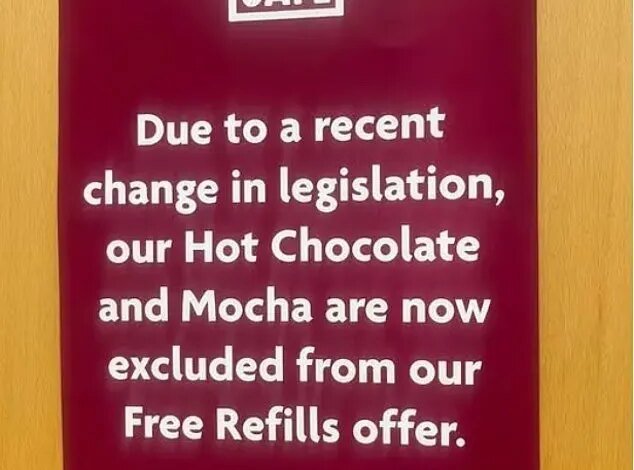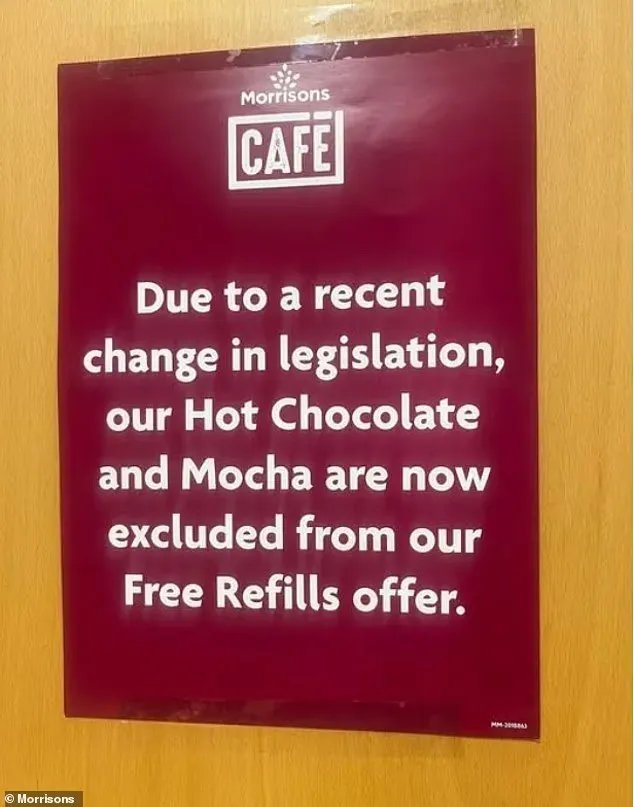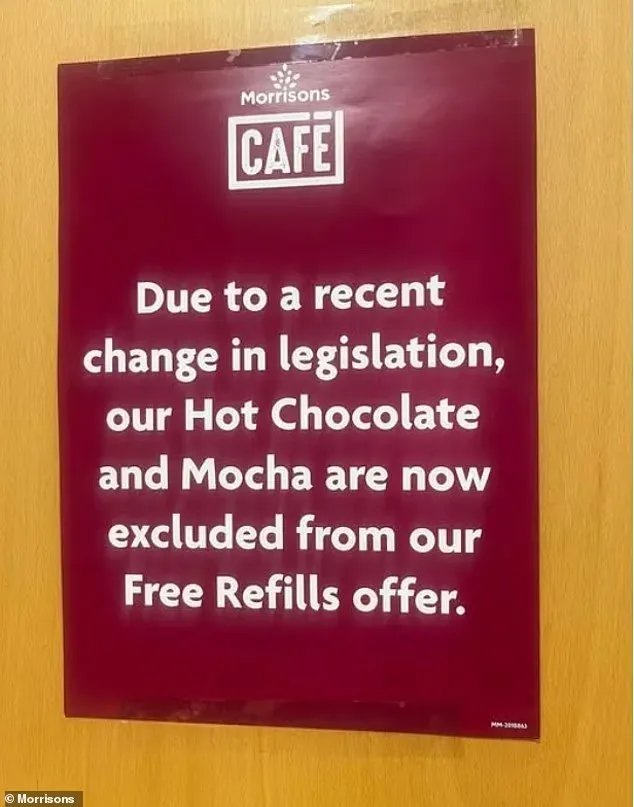Now Morrisons And Wetherspoons Restrict Customers To One Hot Chocolate Per Visit Under New ‘nanny State’ Rules – After Nando’s Sparked Backlash For Limiting Sales Of Coke

Now Morrisons And Wetherspoons Restrict Customers To One Hot Chocolate Per Visit Under New ‘nanny State’ Rules – After Nando’s Sparked Backlash For Limiting Sales Of Coke

uaetodaynews.com — Now Morrisons and Wetherspoons restrict customers to one hot chocolate per visit under new ‘nanny state’ rules – after Nando’s sparked backlash for limiting sales of Coke
Morrisons and Wetherspoons have become the latest UK chains to restrict customers to one drink each under new government rules aimed at cutting sugar consumption.
Earlier this week, chicken chain Nando’s sparked backlash after signs appeared on its refillable drinks machines saying restaurant-goers would only be allowed a single glass of Coca-Cola each.
The move immediately triggered complaints on social media, with people calling it a ‘joke’ and criticising the new ‘nanny state’ rules.
Now, Morrisons customers have taken to social media to share pictures of signs placed next to the self-service machines in the cafe, enforcing the restrictions on the hot chocolates and mochas.
The signs read: ‘Due to a recent change in legislation, our Hot Chocolate and Mocha are now excluded from our Free Refills offer.’
The supermarket chain has since confirmed to the Daily Mail that the decision was made in light of the recent changes to legislation, though free refills are still available on other hot drinks.
Meanwhile, Wetherspoons has also scrapped hot chocolates from its £1.71 or less free refills deal on hot drinks, according to The Sun.
On October 1, new regulations came into effect banning ‘buy one, get one free’ promotions on foods high in fat, sugar or salt, as well as free refills of sugary soft drinks in restaurants and cafés.
Morrisons has restricted customers to one hot chocolate or mocha each after new government legislation was introduced
The ban also extends to free refills of hot sugary drinks, such as hot chocolate and sweetened coffees, including mochas.
The change comes as part of a series of anti-obesity measures that have been gradually introduced since 2021, under then-Health Secretary Matt Hancock.
After viewing the ‘ludicrous’ signs in Morrisons, one person wrote on social media: ‘The world has gone mad. I do hate being told what I can and cannot eat and drink.’
Another added: ‘Can’t have free refills for hot chocolate or mocha, but you can pay for your obesity’, while a third agreed: ‘So you can’t have a free refill but they will gladly sell you another drink!’
The Daily Mail has also reached out to JD Wetherspoon for comment.
It came after Nando’s restricted its customers to a single glass of Coca-Cola Classic.
The Peri-Peri chicken chain, known for its ‘bottomless’ drink option, previously allowed diners to refill soft drinks freely during their meal.
But while zero-sugar options such as Sprite Zero and Fanta Zero remain unlimited, Coca-Cola Classic is now capped at one serving.
An updated sticker on Nando’s drinks machines now reads: ‘Want Coca-Cola Classic? It’s one glass only.
‘Based on new government laws, we’ve had to limit Coca-Cola Classic to one glass per customer. Still thirsty? Help yourself to one of our low-sugar fizzy bottomless soft drinks.’
Wetherspoons has also scrapped hot chocolates from its £1.71 or less free refills deal on hot drinks, according to The Sun. Stock image
Customers soon complained about the ‘ludicrous’ signs on social media
Other restaurant chains believed to have enacted similar restrictions on free refills include Five Guys, Toby Carvery, Harvester, Pizza Hut and Burger King.
Ministers say the policies are aimed at tackling the UK’s growing obesity crisis. than a quarter of adults and a fifth of Year Six pupils in England are now classed as obese.
A Department of Health and Social Care spokesman said: ‘Obesity robs children of the best possible start in life, sets them up for a lifetime of health problems and costs the NHS billions.’
Some public health leaders have called the measures ‘long overdue’, arguing that supermarket and restaurant promotions normalise over-consumption.
Researchers say the approach can work.
A University of Leeds study found that when supermarkets were banned from placing unhealthy items at checkouts and aisle ends in 2022, sales of those products fell by around two million items a day.
The next phase of the crackdown will introduce a watershed on junk-food adverts before 9pm and a ban on online promotions of unhealthy food and drink early next year.
The Daily Mail previously contacted Nando’s, Harvester, Toby Carvery, Five Guys, Pizza Hut and Burger King for comment.
The Peri-Peri chicken chain, known for its ‘bottomless’ drink option, previously allowed diners to refill soft drinks freely during their meal
But while zero-sugar options such as Sprite Zero and Fanta Zero remain unlimited, Coca-Cola Classic is now capped at one serving (stock image)
People took to X over the weekend to share their thoughts on the change – and views on the matter were divided
This map, from the Government’s Office for Health Improvement and Disparities, published earlier this year highlights the areas most blighted by obesity
Obesity rates have soared in recent decades, with more than a quarter of adults and a fifth of Year six pupils now classed as obese, NHS figures show.
Weight-related illness also costs the economy £74billion a year, with people who are overweight at increased risk of heart disease, cancer and type 2 diabetes.
Similar rules are due in Wales next year, with Scotland expected to follow.
These latest restrictions build on earlier efforts to curb the nation’s sugar intake.
In 2018, the Soft Drinks Industry Levy—often referred to as the ‘sugar tax’—came into force, charging manufacturers for beverages containing more than 5g of sugar per 100ml.
The move prompted many brands, including Fanta and Lucozade, to reformulate their drinks with less sugar, while others, such as Coca-Cola, chose to absorb the levy rather than alter recipes.
Since then, ministers have focused on reducing the visibility and promotion of foods high in fat, salt and sugar.
They are now moving towards direct limits on portion size—starting with the new ban on free refills of sugary soft drinks in restaurants and cafés.
Supermarkets have previously been barred from placing confectionery at checkouts and aisle ends.
Hospitals have also taken steps to curb over-consumption, with NHS England introducing limits on supersized snacks and sugary drinks sold in hospital shops and vending machines as part of its healthy eating framework for staff and visitors.
The UK’s approach contrasts with that of the United States, where New York City once attempted to ban ‘supersized’ sodas under Mayor Michael Bloomberg.
The proposal—which would have capped sugary drinks sold in restaurants and cinemas at 16 ounces—was struck down by the courts in 2014 before it could take effect.
Public health campaigners say Britain’s gradual tightening of rules—combining taxes, placement restrictions, advertising curbs and now portion limits—is starting to show results, but warn that obesity levels remain among the highest in Europe.
Obesity itself increases the chances of person suffering serious health conditions that can damage the heart, such as high blood pressure.
Last year, a sobering report also suggested Britain’s spiralling obesity levels have fuelled a staggering 39 per cent rise in type 2 diabetes among people under 40, with 168,000 Brits now living with the illness.
Piling on the pounds has also been linked to at least 13 types of cancer and is the second biggest cause of the disease in the UK, according to Cancer Research UK.
Disclaimer: This news article has been republished exactly as it appeared on its original source, without any modification.
We do not take any responsibility for its content, which remains solely the responsibility of the original publisher.
Disclaimer: This news article has been republished exactly as it appeared on its original source, without any modification.
We do not take any responsibility for its content, which remains solely the responsibility of the original publisher.
Author: uaetodaynews
Published on: 2025-10-10 09:37:00
Source: uaetodaynews.com




